Introduction
In the relentless pursuit of a healthier lifestyle, understanding the intricacies of hormonal belly fat is paramount. This guide delves into the multifaceted nature of abdominal fat influenced by hormonal imbalances, providing valuable insights into its causes and effective strategies for management. Hormonal fluctuations, whether due to stress, menopause, or thyroid issues, play a significant role in fat distribution, particularly around the midsection.
Exploring the impact of hormones such as cortisol, insulin, and estrogen, this article underscores the importance of hormonal balance in achieving optimal metabolic health.
By addressing the root causes of hormonal belly fat, including stress, poor diet, lack of exercise, and inadequate sleep, a comprehensive approach to wellness can be established. Practical dietary changes, targeted exercise routines, and stress management techniques are highlighted to empower individuals in their journey towards reducing abdominal fat. Additionally, the significance of quality sleep in hormonal regulation further emphasizes the interconnectedness of lifestyle factors in maintaining a healthy body composition.
Join in this exploration of hormonal belly fat and discover actionable steps that can lead to a healthier, more balanced life. By understanding the pivotal role of hormones and implementing strategic lifestyle changes, the path to improved well-being and reduced abdominal fat becomes attainable.
Understanding Hormonal Belly Fat
Belly fat related to hormones can be exceptionally challenging, especially for individuals experiencing fluctuations due to stress, menopause, or thyroid issues. Understanding the role hormones play in fat distribution is a crucial step in addressing this problem. Hormones such as cortisol, insulin, and estrogen, when imbalanced, can significantly impact fat storage around the abdomen. For instance, as estrogen levels fall during menopause, women are more susceptible to insulin resistance, a precursor to metabolic disorders including type 2 diabetes. Recent meta-analysis research of 17 randomized controlled trials involving over 29,000 participants revealed that hormone therapy significantly reduces insulin resistance in healthy postmenopausal women. This indicates that endocrine equilibrium is essential for controlling abdominal fat and general metabolic well-being. Additionally, imbalances in hormones are frequently at the core of various underlying problems, ranging from adrenal fatigue and elevated blood sugar to fertility issues and thyroid conditions. Tackling these imbalances using an all-encompassing method that encompasses nutrition, physical activity, and management of pressure can assist in attaining improved health of the glands and decreasing abdominal fat.
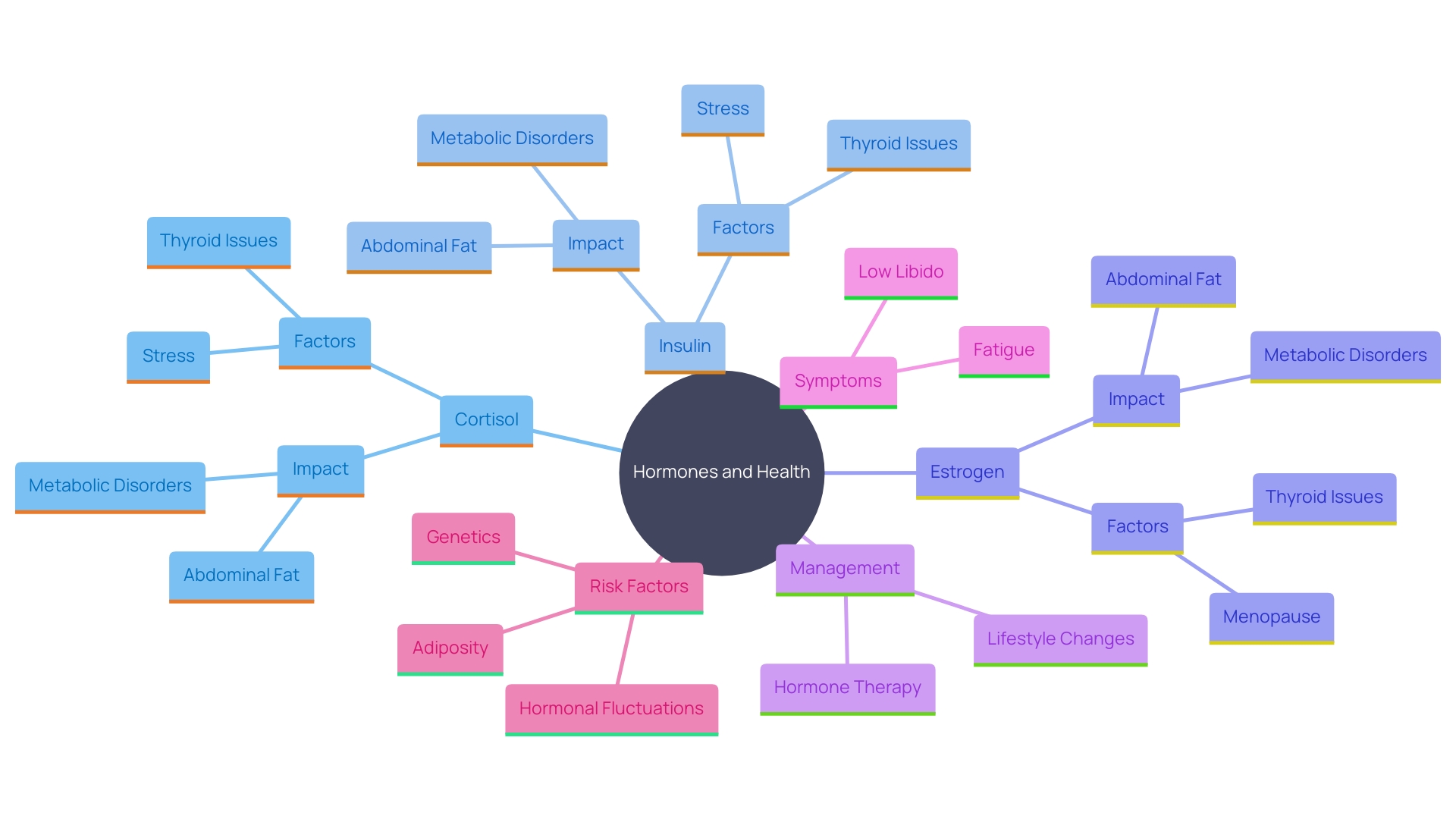
Causes of Hormonal Belly Fat
Numerous elements lead to hormonal belly fat, including tension, poor diet, lack of exercise, and inadequate sleep. Stress triggers cortisol production, which can lead to increased fat retention. Chronic stress manifests physically as inflammation, further complicating weight loss efforts. Cortisol's role in stress-induced inflammation is well-documented, with studies linking it to metabolic syndrome—a cluster of conditions including excess belly fat, high blood pressure, and insulin resistance.
Poor dietary habits also play a significant role. Diets high in sugar and processed foods can cause insulin resistance, promoting fat storage in the abdominal area. Research highlights the negative impact of high sugar consumption on metabolic well-being, emphasizing the necessity of balanced nutrition.
Lack of exercise exacerbates the issue by reducing the body's ability to regulate hormones effectively. Physical activity affects hormone dynamics, influencing several physiological processes, including metabolism and fat distribution. Engaging in regular physical activity can help balance hormones and improve overall health. Finally, inadequate sleep disrupts the regulation of hunger and satiety hormones like ghrelin and leptin, leading to increased appetite and potential weight gain. Studies show a direct link between insufficient sleep and higher body mass index (BMI), making adequate rest crucial for weight management.
Understanding these root causes is vital for creating an effective strategy to combat hormonal belly fat. 'Tackling tension, improving diet, incorporating regular exercise, and ensuring adequate sleep can collectively contribute to a healthier body composition and enhanced well-being.'.
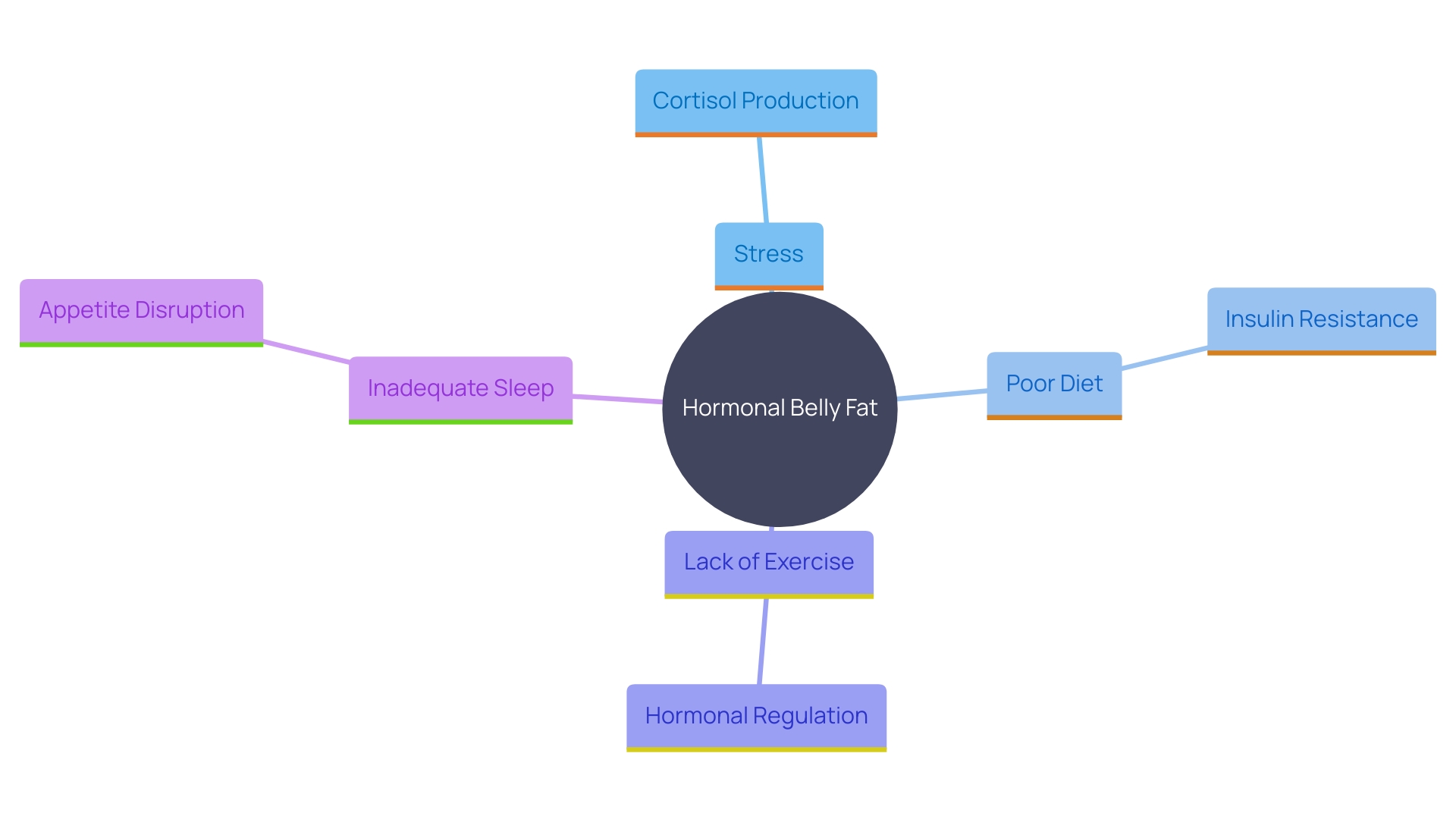
The Role of Hormones in Belly Fat
Hormones are pivotal in regulating body weight and fat distribution, particularly around the abdomen. Cortisol, frequently called the hormone linked to tension, not only boosts desires for unhealthy foods but also results in greater amounts of abdominal fat. This hormone's effect is especially significant when pressure is chronic, as consistently high cortisol levels can disrupt normal metabolic processes. Insulin, another key hormone, manages blood sugar levels. However, consistently high insulin levels can lead to increased fat storage, especially in the abdominal area.
Balancing these hormones through lifestyle changes is crucial. Unhealthy eating habits, elevated pressure, and contact with environmental pollutants such as pesticides and xenoestrogens can worsen endocrine disruptions, leading to heightened aromatase activity. This activity converts androgens into estrogens, leading to higher levels of endogenous estrogen and lower testosterone, which are associated with obesity and metabolic disorders. For women, changes in hormones during puberty, menstruation, pregnancy, and menopause significantly affect body composition and metabolic well-being.
Research has shown that women with polycystic ovary syndrome (PCOS) often experience insulin resistance, which can lead to excessive weight gain and an increased risk of type 2 diabetes. The complex relationship between testosterone levels and body fat percentage varies between individuals, with studies indicating a notable gender difference in energy intake and body composition. For instance, men generally have higher energy intake but lower body mass index (BMI) compared to women.
By tackling these endocrine discrepancies through nutrition, physical activity, and stress control, individuals can strive to decrease abdominal fat and enhance general well-being. Foods abundant in magnesium, such as leafy greens, can assist in hormone production and equilibrium, while practices like seed cycling can promote well-being throughout various stages of the menstrual cycle.
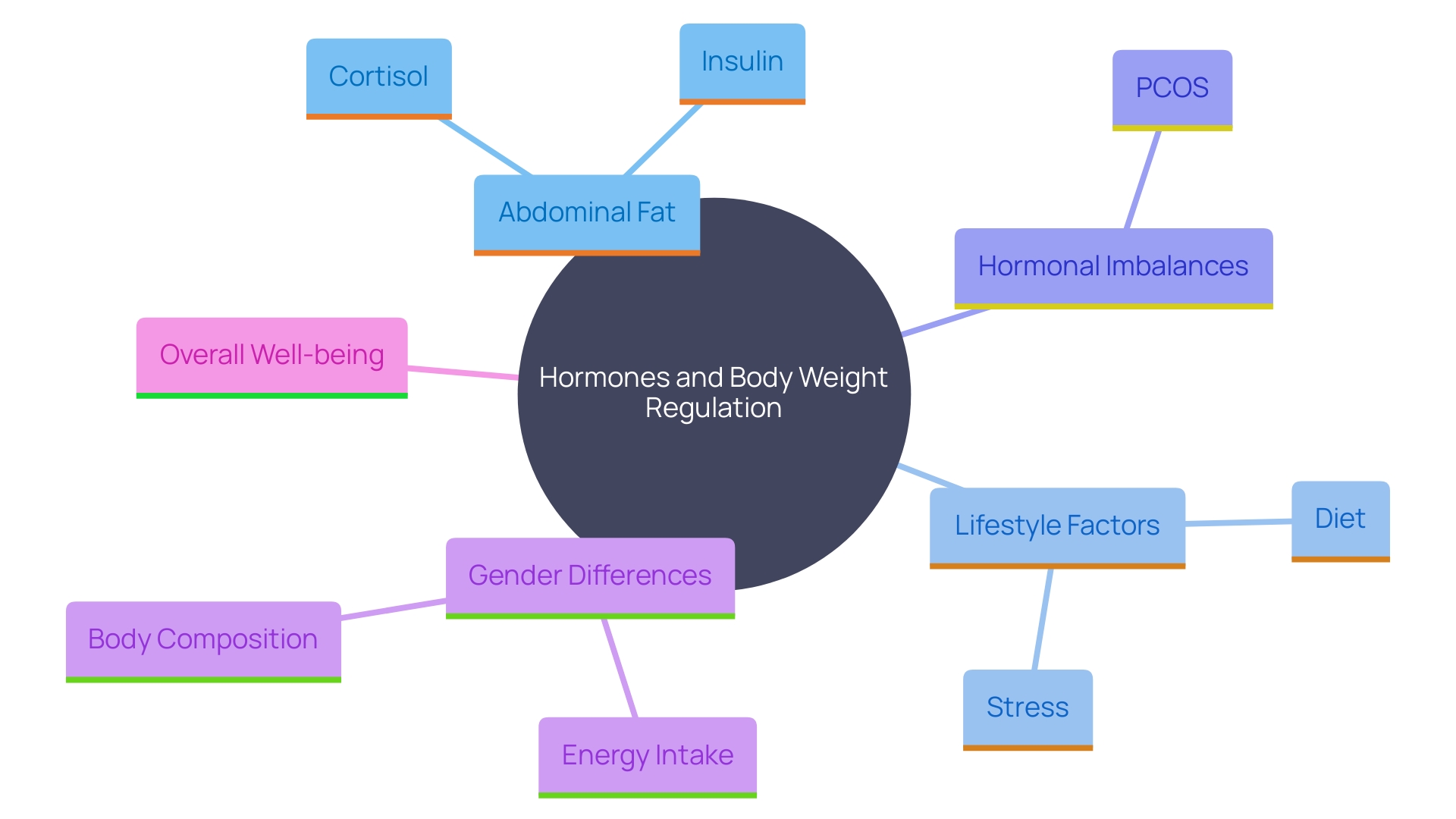
Dietary Changes to Reduce Hormonal Belly Fat
To effectively combat hormonal belly fat, a balanced diet rich in whole, nutrient-dense foods is crucial. Including a range of fruits, vegetables, lean proteins, and nutritious fats not only assists in regulating hormones but also promotes overall metabolic well-being. Studies have shown that diets emphasizing whole foods lead to significant weight loss, reduced body fat, and better insulin sensitivity.
Reducing sugar and refined carbohydrates is particularly important for maintaining stable insulin levels. High insulin levels can lead to increased fat storage, especially in the abdominal area. Instead, opt for foods high in fiber, such as whole grains, legumes, and leafy greens. These foods improve digestion, promote satiety, and help maintain a healthy weight.
Staying hydrated is another essential component of a healthy diet. Adequate water intake supports metabolic processes and can aid in fat loss. Research indicates that even slight dehydration can slow down metabolism, making it harder to lose weight.
A low-fat, plant-based diet, including foods like soybeans, has been associated with positive changes in the gut microbiome and a reduction in symptoms such as hot flashes, which are common in postmenopausal women. This method not only aids in weight control but also provides extra advantages, including enhanced cholesterol levels and decreased inflammation.
By concentrating on these nutritional approaches, individuals can efficiently control endocrine irregularities, decrease abdominal fat, and improve their general wellness and vitality.
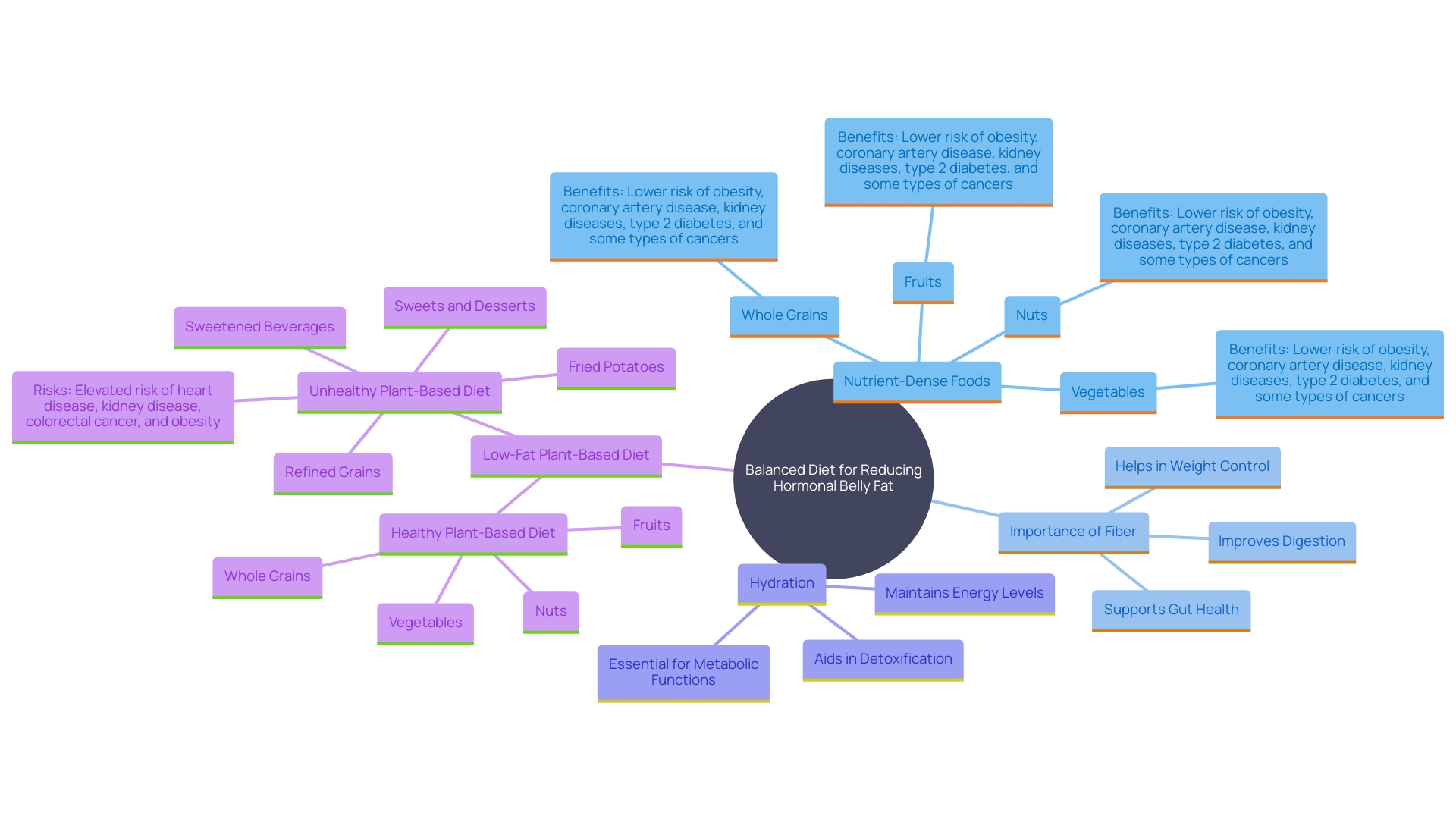
Exercise Strategies for Hormonal Belly Fat Loss
Regular physical activity is essential for managing hormonal belly fat due to its multifaceted benefits. Engaging in a mix of cardiovascular exercises, such as walking, running, or cycling, alongside strength training, not only helps in burning fat but also builds muscle, which is crucial for maintaining a healthy metabolism. High-Intensity Interval Training (HIIT) has been found to be particularly effective in reducing abdominal fat. Studies have shown that even light physical activity can reverse the adverse effects of sedentary behavior, while moderate-to-vigorous physical activity can significantly reduce body fat.
Strive for a minimum of 150 minutes of moderate aerobic exercise weekly, along with strength training on two or more days to enhance fat loss and boost overall well-being. This combination of exercises has been shown to improve various wellness markers, including insulin sensitivity and cardiovascular condition. Notably, long-term commitment to regular physical activity can lead to more robust changes in fat tissue and overall well-being, as indicated by research.
For instance, a study published in 'Nature Communications' revealed that increasing sedentary time from childhood to young adulthood caused a significant rise in body fat, but this effect could be reversed by engaging in at least three hours of light physical activity daily. This highlights the significance of regular physical activity in controlling belly fat and avoiding associated medical problems. Moreover, physical activity influences fat distribution and enhances skeletal health and balance of hormones, establishing it as a comprehensive method for addressing abdominal fat and improving quality of life.
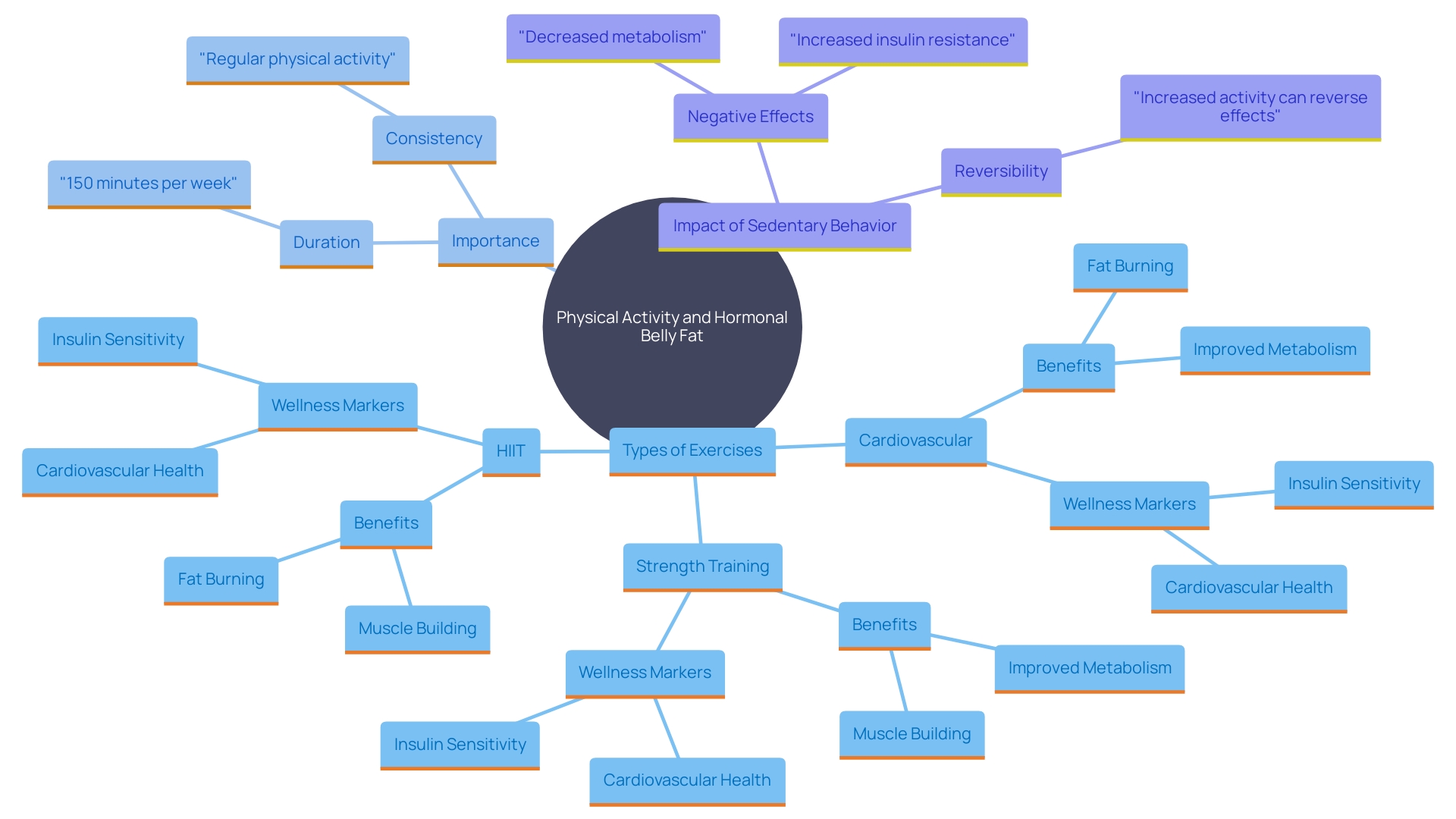
Managing Stress and Sleep for Hormone Balance
Handling pressure is essential for sustaining endocrine equilibrium. Incorporating relaxation techniques such as yoga, meditation, or deep breathing exercises can help lower cortisol levels, which are often elevated due to stress. Research shows that mindfulness meditation, in particular, is effective in reducing cortisol levels, especially among highly stressed individuals or those susceptible to stress-related diseases.
Furthermore, quality sleep plays a crucial role in the regulation of hormones and overall health. Aim for 7-9 hours of sleep per night to support hormonal balance and weight management. Studies have shown that insufficient sleep can lead to insulin resistance, increasing the risk for conditions like type 2 diabetes, cardiovascular disease, and hypertension. This is particularly significant for women, who often experience poorer sleep than men.
A balanced diet also helps improve sleep and anxiety management. Foods rich in magnesium, such as almonds and pumpkin seeds, can promote muscle relaxation and a sense of calm, aiding in sleep. Understanding the relationship between sleep, tension, and nutrition is vital for overall well-being. By prioritizing quality sleep, managing stress effectively, and making informed dietary choices, you can lay the foundation for a healthier, more balanced life.
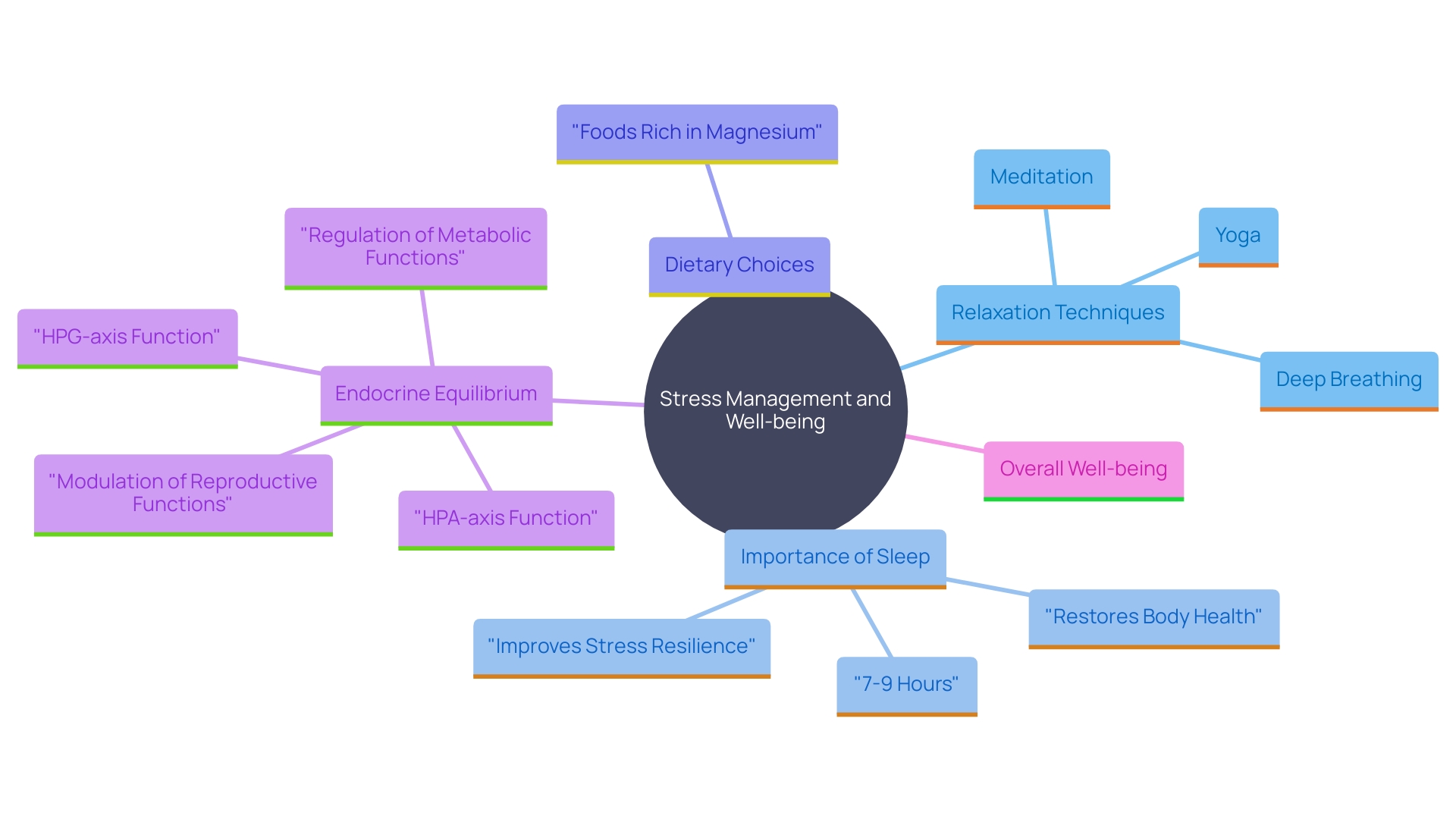
Additional Tips for Reducing Hormonal Belly Fat
Small lifestyle changes can create a significant impact on your journey to reduce hormonal belly fat. Meal prepping is a powerful tool to ensure you maintain a healthy diet. For example, Albina Angan, who successfully lost 50 lbs, emphasizes starting the day with a protein-rich breakfast and having a smaller, vegetable-focused dinner. This strategy helps regulate insulin levels, especially crucial for those managing conditions like PCOS, which affects 6-12% of women according to the CDC.
Mindful eating is another essential practice. By paying attention to your hunger cues and eating slowly, you can avoid bingeing and improve your relationship with food, which is vital for long-term success. A food journal can be a helpful resource in this process, allowing you to track your progress and make necessary adjustments.
Support from a community can also play a pivotal role in your success. Programs like Healthy Food Rx have shown that social connections and support significantly increase motivation and accountability. Participants in such programs have seen improved food security, with significant increases in fruit and vegetable intake, demonstrating the power of collective effort and encouragement.
As Kevin Lincoln, Mayor of Stockton, stated, 'The future of Stockton relies on the welfare and well-being of the people who reside here.' This highlights the importance of being part of a supportive community that fosters health and well-being. Remember, these small, consistent changes can lead to lasting results and a healthier you.
When to Consider Medical Treatment
When lifestyle changes aren't sufficient to address belly fat related to hormones, seeking medical guidance becomes crucial. Hormonal imbalances, often complex and multifaceted, might necessitate interventions beyond diet and exercise. Hormone replacement therapy (HRT) can be a game-changer for some individuals, addressing issues like low libido and fatigue caused by deficiencies in hormones. According to Dr. Cohn, excess belly fat is rarely due to a single hormone but a combination of factors, including caloric intake and metabolic changes.
Increased metabolic syndrome scores, for instance, have been associated with a higher likelihood of different cancers, emphasizing the significance of tackling underlying medical issues. Moreover, bariatric surgery has shown significant benefits for women with polycystic ovary syndrome (PCOS) and obesity, including improvements in cardiometabolic risk factors and spontaneous ovulation rates.
Statistics indicate a growing prevalence of obesity, with over 40% of U.S. adults affected. This highlights the necessity for thorough medical assessments to recognize and address imbalances in hormones effectively. By integrating medical therapies with lifestyle modifications, individuals can achieve better health outcomes and reduce hormonal belly fat.
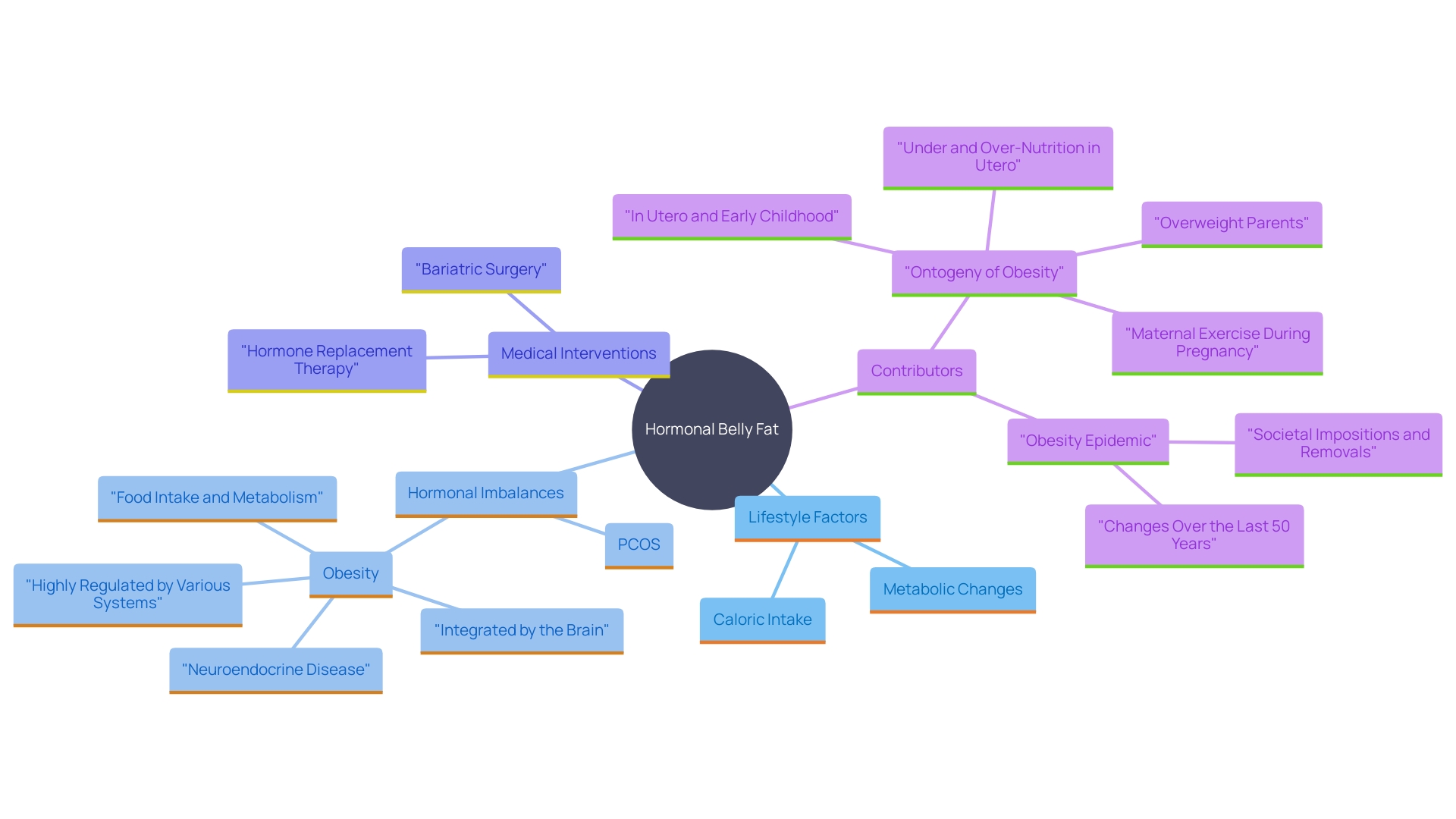
Conclusion
Understanding and managing hormonal belly fat is essential for achieving optimal health and well-being. The interplay of hormones such as cortisol, insulin, and estrogen significantly influences fat distribution, particularly in the abdominal area. Recognizing the various factors contributing to hormonal imbalances—stress, inadequate sleep, poor dietary choices, and lack of exercise—provides a comprehensive framework for addressing this prevalent issue.
Implementing strategic lifestyle changes is critical. A balanced diet rich in whole foods, regular physical activity, effective stress management techniques, and adequate sleep can collectively foster hormonal balance and support weight management. These approaches empower individuals to take charge of their health, paving the way for a healthier body composition and improved metabolic function.
Moreover, when lifestyle modifications do not yield the desired results, seeking medical guidance becomes vital. Hormonal imbalances may require targeted interventions, including hormone replacement therapy or other medical treatments, to achieve lasting change. By combining lifestyle strategies with appropriate medical support, a path toward reduced abdominal fat and enhanced overall health is not only possible but attainable.
Embracing these holistic approaches can lead to a more balanced, healthier life.




